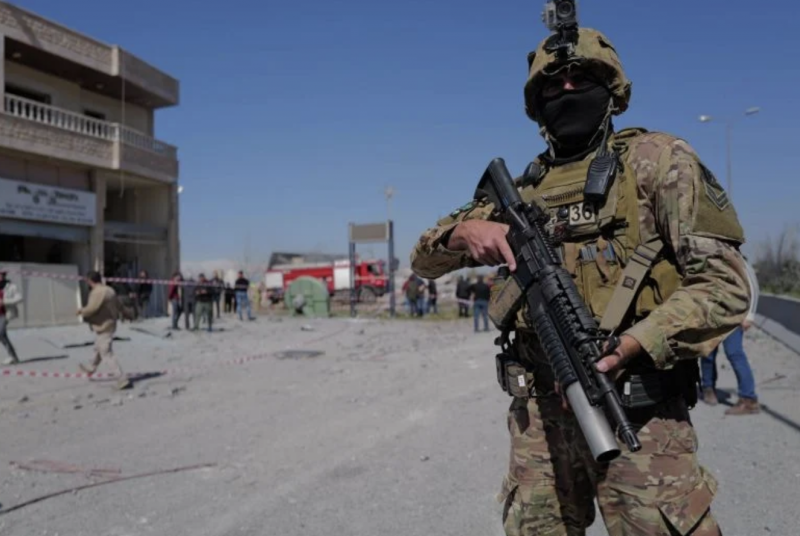
The site of one of the Israeli strikes on the Sefri road, just before Baalbeck. (Credit: Matthieu Karam/L'Orient-Le Jour)
Independent Activist Rouba Taha was highly engaged during the 2019 uprising. “I am not easily intimidated,” she said.
Despite her resilient demeanor, the recent Israeli strikes on Baalbeck left this town resident with a pervasive sense of insecurity.
“We no longer feel safe. Israeli missiles could strike us at any moment. I fear for my children, parents and friends,” she said.
An Israeli airstrike targeted the Bekaa area on Feb. 26. This marked the first such incident since clashes between the pro-Iranian group and Israel erupted on Oct. 8, in the wake of Hamas’ attack on Oct. 7.
The conflict centered in southern Lebanon until Monday and Tuesday when additional Israeli bombardments targeted Baalbeck.
On Monday evening, two airstrikes struck a timber warehouse situated between the villages of Shmustar and Taraya in the Baalbeck-Hermel area, as well as a two-story building in Ansar, east of Baalbeck. The attacks resulted in the death of one civilian, identified as footballer Moustapha Gharib, and left several others injured.
On Tuesday — the following day — two additional strikes occurred, claiming another civilian’s life early in the afternoon. These strikes targeted the Sefri road, leading to Baalbeck, and the village of Nabi Sheet.
Tahrir*, aged 47, is a public sector teacher currently on sick leave. She found herself close to two of the strikes, as she lives between Riyaq and Telya.
“During one of Tuesday’s strikes, I felt as though my iron door was about to vanish,” she said. “The entire house shook.”
Hassan Moussawi, a civil servant in his forties, resides just 200 meters from one of the Israeli strikes in Nabi Sheet. “Initially, we were stunned,” he recalled. “But we are a resilient people, and we quickly regrouped to rush to the impacted areas to assist any injured people.”
Deserted schools and markets
Taha was distressed for the children, who “feel the gravity of the situation” and the fear that had taken hold since the strikes began.
His children refused to go to school the next day. The schools did not close following the strikes but there were absences, said Karim*, a 43-year-old teacher in Baalbeck.
“I haven’t panicked because I’m used to fighting, having already lived through [the 2006 war]. But it’s clear that there’s a fear that the insecurity will continue,” he said.
The markets have also been affected. Karim*, also a shopkeeper, said that “the souks empty instantly when there are strikes.”
“Right from the first attack, the town’s market was deserted, even though we are in the middle of Ramadan,” Taha said.
The holy month began on Monday for the Sunni community and Tuesday for the Shiite community.
Assaad Qaraa, a pharmacist living in the town of Baalbeck, said that “people went back to work immediately after the strikes, but tend to limit their movements.”
However, he pointed out that “economic activity is slowing down in all cases because of the crisis and Ramadan.”
According to Moussawi, “Nabi Sheet has long been at the forefront of the resistance, so after the initial shock of the strikes, everyone resumes their normal activities.”
“If you look at the people today [Wednesday, Mar. 13], they’re going about their day as usual, calmly getting ready for iftar,” he added.
‘We don’t want other people’s war’
The recent Israeli attacks on Baalbeck have stirred fears of a prolonged and arduous conflict, evoking memories of the 2006 war.
“People are completely despondent; their only hope now is survival, yet they’re too fearful to protest,” said Taha.
Tahrir said she was feeling even more apprehensive than she did in 2006.
“During that previous conflict, there seemed to be rules and boundaries respected by both sides. We had some idea of which areas were under threat,” she said. “Now, the conflict appears wide open to all possibilities, and I’m convinced that Hezbollah is fighting its own battle while the Israeli government is capable of anything.”
For Qaraa, “People anticipate war and fear that the situation in the Bekaa will escalate quickly.”
“They tend to stockpile food in preparation for potential conflict,” he added.
Moussawi, on the other hand, wasn’t surprised that the Bekaa was targeted.
“Just like in 2006, we need to be patient because the Israeli war machine has always been active. It’s clear that we’re afraid, especially for our children,” he said. “However, it’s also normal that we’ll be called upon to resist the Israeli attacks once again.”
*First name has been changed upon the request of the interviewee
This article was originally published in L'Orient-Le Jour. Translated by Sahar Ghoussoub.